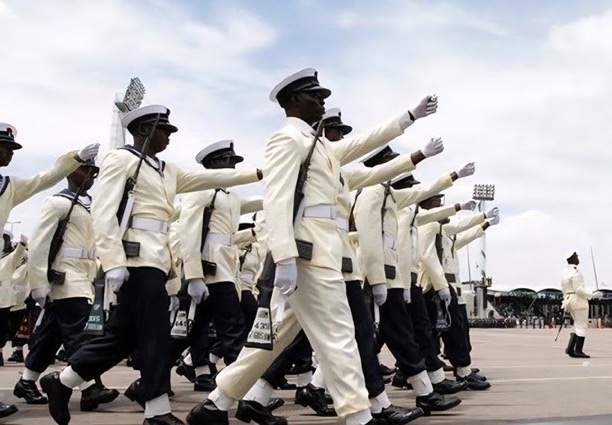
JUST IN: Nigerian Navy Lieutenant Dismissed And Jailed For Affair With Colleague’s Wife

The Nigerian Navy has announced the dismissal and sentencing of one of its lieutenants after a military court found him guilty of engaging in what was described as a scandalous and unprofessional relationship with the wife of a fellow officer. The news, which broke today, has sent shockwaves across the military community and beyond, sparking debates on discipline, morality, and professionalism within the Nigerian Armed Forces.
According to reports, the lieutenant, whose name has been withheld by the authorities for official reasons, was accused of betraying the trust of a fellow officer by initiating and maintaining an illicit relationship with the officer’s wife. The matter, described by military sources as highly embarrassing and damaging to the image of the service, was first brought to light after suspicions were raised by the aggrieved officer, leading to an internal investigation by the Navy. The investigation reportedly uncovered sufficient evidence to charge the lieutenant before a court-martial, where the panel of senior officers deliberated extensively on the matter before delivering its verdict.
The lieutenant, a young officer who had until now been considered promising, was arraigned before the naval court-martial in accordance with the Armed Forces Act. He faced charges bordering on scandalous conduct, which is considered a grave offence in the military as it goes against the values of discipline, integrity, and respect for fellow officers. After weeks of hearings, where witnesses, including the aggrieved officer, gave testimony, the panel concluded that the lieutenant was guilty of the allegations. The judgment handed down was dismissal from the Nigerian Navy with immediate effect and a three-year prison sentence to serve as both punishment and deterrence to others.
Military sources described the verdict as tough but necessary, stressing that the Nigerian Navy operates on a foundation of strict discipline and cannot afford to condone actions that undermine the moral fabric of the force. “This is a serious breach of trust and a betrayal of a fellow officer. The Navy cannot overlook such behaviour because it erodes discipline and sets a bad precedent for others,” one senior officer told reporters. He added that the punishment was meant to send a strong signal that officers, regardless of their rank, are expected to uphold the highest ethical standards both in and out of uniform.
The sentencing has sparked widespread discussions both within the military and in civilian circles. On social media, Nigerians have expressed mixed reactions, with some commending the Navy for upholding discipline and others questioning whether the punishment was too harsh for what they see as a private moral issue. “Three years in prison and dismissal from service for sleeping with someone’s wife? It feels too extreme,” one user wrote on X, while another countered, “It’s not about morality alone, it’s about professionalism and loyalty. In the military, betrayal like this can affect unity and trust among officers.”
Legal experts have also weighed in, noting that the Armed Forces Act makes provisions for offences considered scandalous or unbecoming of an officer, which can attract severe punishments including dismissal, imprisonment, or both. According to one military law specialist, the lieutenant’s offence was not merely about adultery but about conduct that undermines the cohesion of the force. “The military is different from civilian life. Officers are held to higher standards, and actions that may appear as private misconduct in civilian life can have far-reaching implications in the military. This is why the Armed Forces treat such cases with utmost seriousness,” the lawyer explained.
The scandal has also reignited broader conversations about discipline in the Nigerian military, especially at a time when the country faces multiple security challenges requiring a united and focused armed forces. Observers say such incidents, if left unchecked, could sow discord among personnel and weaken the sense of brotherhood and loyalty that is vital to effective military operations. A retired naval officer, reacting to the news, noted that while the punishment may appear severe to outsiders, it was necessary to preserve the integrity of the force. “The Navy is a disciplined institution. Every officer swears an oath to uphold loyalty and respect to the service and to each other. Once that bond is broken, it can spread like a virus and affect operational effectiveness. That is why issues like this are treated swiftly and firmly,” he said.
For the dismissed lieutenant, the future now appears uncertain. Beyond the three-year jail term, dismissal from service carries with it lasting stigma and the loss of benefits, entitlements, and career prospects. Military sources confirmed that his dismissal was with ignominy, meaning he would lose all privileges associated with his rank. For many young officers, his story now stands as a cautionary tale about the consequences of allowing personal misconduct to derail a promising career.
Meanwhile, the Nigerian Navy has used the occasion to reaffirm its commitment to discipline and professionalism. In a statement released shortly after the judgment, the naval authorities emphasized that the force would continue to maintain high ethical standards among its personnel and ensure that acts capable of tarnishing its image are decisively dealt with. The statement read in part: “The Nigerian Navy remains committed to upholding the highest standards of discipline, loyalty, and integrity among its officers and ratings. Any act that undermines these values will be met with the full weight of military law.”
The case has drawn attention not only because of the scandalous nature of the affair but also because it touches on the broader theme of accountability within the military. Analysts point out that in a country where institutions are often accused of failing to discipline erring officials, the Navy’s swift action demonstrates a commitment to internal accountability. This, they argue, could boost public confidence in the military as a disciplined and responsible institution.
Still, questions linger about whether such personal matters should be criminalized within the military system. Critics argue that while the conduct was wrong, sending the lieutenant to prison rather than just dismissing him may be excessive. Some have also raised concerns about the welfare of military families, pointing out that the emotional and psychological impact of such scandals often extends to spouses and children.
For now, the ruling remains final unless appealed, but it is clear that the case will continue to generate conversations in the weeks ahead. For the Nigerian Navy, the incident is a reminder of the delicate balance it must strike between upholding discipline and addressing issues of personal morality within its ranks. For the public, it is yet another glimpse into the strict world of military justice, where even private choices can carry grave consequences when they are deemed to threaten the cohesion and reputation of the armed forces.
At a time when Nigeria is relying heavily on its military to combat insurgency, piracy, and other threats, the scandal serves as both a warning and a lesson. The Navy has made its stance clear: there is no room for conduct that undermines trust, loyalty, or discipline, no matter how personal the matter may appear. And for officers in the service, the fate of the young lieutenant is now a stark reminder that one scandalous decision can bring an entire career crashing down.


